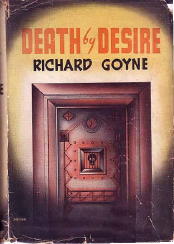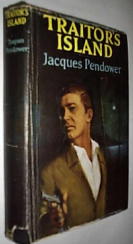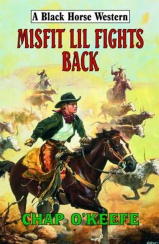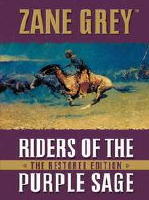Fri 14 Sep 2007
KEITH CHAPMAN on Lesser-Known British Crime Fiction Writers and Detectives Wearing Cowboy Boots.
Posted by Steve under Authors , Western FictionNo Comments
Hi Steve
I’ve come to Mystery*File via Steve Holland’s Bear Alley and his mention of your recent entries about the British writer T. Arthur Plummer.
You have a fascinating blog, with tons of material that interests me. For instance, I began reading Sexton Blake books when I was eight or nine, and I began my working life at Fleetway House as editor W. Howard (“Bill”) Baker’s junior assistant on the venerable detective series when Michael Moorcock left the company in 1961.

Like yourself, I haunted my local public library’s grown-up section from a very young age, borrowing Saint books and the like on my dad’s library card. So, since this was in England, I was well aware of Plummer’s Frampton titles.
These days I live in New Zealand and write for a UK genre fiction line published by Robert Hale Ltd — Black Horse Westerns. I also run a website at www.blackhorsewesterns.com . You might enjoy the article “Detectives in Cowboy Boots” in the March-May edition. [I’ve read it, and I recommend it highly to everyone reading this. –Steve]
You’ve mentioned having a primary collecting interest in writers like Plummer and Andrew Spiller. Another I remember was Richard Goyne. They were regular fixtures on the Stanley Paul/John Long catalogues in the 1950s and later. Others were W. Murdoch Duncan and the now famous Ruth Rendell. A few years ago, I picked up a positively shocking sum of money for a first-edition copy of Rendell’s first book, From Doon With Death (1964) in “fine” condition. When I say the money was more than I can earn in three months of writing, I’m sure you’ll understand why I couldn’t say no to the offer.
All the Paul crime authors were absorbed eventually into the Long list as part of a Hutchinson group rationalization. Yes, they did make such moves in the publishing industry even back then, though they might not have called it “rationalization”.

Another writer from the Stanley Paul stable was T.C.H. Jacobs/Jacques Pendower, with whom I later had some dealings when editing westerns and the Edgar Wallace Mystery Magazine in the 1960s. You can pick up on some of this in the “Detectives in Cowboy Boots” article.
To continue with the blog comments made in connection with Plummer, I don’t think any of these writers of the past wrote to achieve immortality. I doubt whether the thought entered their heads. Money was one driver. Another was that writing fiction is for many something like a drug — you just can’t kick the habit.
No way will I or my writing fellows of today achieve immortality, by the way. The print-runs for hardcover library fiction are even shorter than they were in Plummer’s time. After all, each copy is going to have a hundred or so readers in its lifetime. So don’t expect to find them on Abe or equivalent sites in 50 years’ time! My latest western, Misfit Lil Fights Back, was published on July 31. By August 17, the publisher’s warehouse was out of stock and the title was deleted from his online catalogue after just over two weeks of “life”. Reprints — other than in large-print editions, again for libraries — are unheard of. In some ways, this can be very dispiriting.

I’ve heard from others besides yourself, Steve, that westerns in your country are nearly an extinct breed. “Except for the steady line of sexy westerns, which I don’t read,” you say. To look on the brighter side, Hollywood is going through one of its sporadic revivals of interest and there’s a lively new blog, the Saddlebums Western Review. [A site that’s gotten off to a great start. I hope they can keep it up. –Steve]
I was interested in what you had to say about the “sexy” western lines, not because I sprinkle my work with gratuitous scenes — as some of the anonymous authors for those lines have done in the past — but because I do like to write a genuine adult story. This does sometimes cause problems. Conservative library-book publishers have their worries about “violence towards the women characters,” for instance.
I take care to see that the sex/violence in my books is woven into the fabric of characterization and storyline. Also, observations on the morality, the beliefs and social behaviour of the times are based on careful research. Generally, I believe unfudged scenes are what an adult reader of fiction in 2007 expects to find. The old “show don’t tell” imperative is stronger than ever and very evident in successful books, movies and TV programmes.
I understand that US publishers Five Star have lately put out the original, unexpurgated version of Zane Grey’s Riders of the Purple Sage. One day I hope to obtain a copy and study the differences.

I also found your blog entry on western writer L. P. Holmes. Your comments on the crime component in westerns are well put, and coincide with my — and many others’ — conclusions. [This was in a review of Edge of the Desert, which he wrote as by Matt Stuart. Alas, my coverage of western/crime fiction has dwindled greatly since then. –Steve]
By all means use my email as a blog post if you think that fitting, though you’d be right in saying it’s off-the-cuff stuff. Short on startlingly new facts, for sure. I enjoy the reminiscing, but pleasant though it can be, it does cut into your more productive writing time. As I recently told another blogger, I try not to look back for “greatest satisfactions” in life. I’m sure that for me the notion the best lies somewhere in the past carries with it the danger of making me a melancholic. I look for satisfactions in the present and I’m content when I finish my latest book convinced that from one aspect or another it’s the best thing I’ve written.